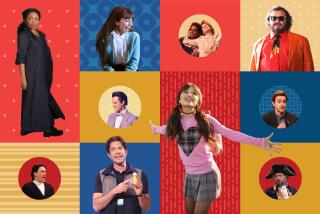Mike Douglas left his ego off the set
- Share via
Mike Douglas died last week. As a second-tier, syndicated talk show host from an already distant past, his name will mean little or nothing to most anyone under age 45. And even as someone old enough to have watched him, my first thought on being told that he had passed away was of Michael Douglas, son of Kirk.
Though by any reckoning an enormous success in his time -- large audience, multiple Emmys, high pay -- Douglas faded quickly from cultural memory. Like his more boisterous contemporary Merv Griffin, with whom he is somehow easy to confuse, Douglas was Irish-by-ancestry, soft, small (or, I should say, he seems small in my memory -- he may have been 6-foot-2 for all I know) and a former big band singer with a voice and mien too unremarkable to sustain a solo career in music. (Yet as a talk show host, Douglas got to sing to an audience of millions, five days a week.)
For the record:
12:00 a.m. Aug. 23, 2006 For The Record
Los Angeles Times Wednesday August 23, 2006 Home Edition Main News Part A Page 2 National Desk 0 inches; 27 words Type of Material: Correction
Mike Douglas: The photograph of Mike Douglas in the Aug. 14 Calendar section that accompanied an appreciation of the late talk-show host was inadvertently printed in reverse.
Too featureless to lampoon, as Rick Moranis famously did Griffin, or Dan Aykroyd did Tom Snyder -- to be preserved, as it were, in comedy -- he nevertheless made an unprepossessing personality work in his favor. It made him free.
It’s not insignificant that his was a daytime show, pitched primarily to housewives, or that for most of its run, “The Mike Douglas Show” was broadcast from slightly off the media’s beaten path. It began in Cleveland in 1961, moved to Philadelphia in 1965 and only in 1978, a few years before its demise, settled in Los Angeles. Being a little out of the way meant there was no need for Douglas to seem other than he was, to come on hip or cutting or funnier-than-thou.
He seemed to know he was less important, less interesting, than his guests. He didn’t flash his insider credentials, because he wasn’t an insider. He didn’t show off or point incessantly to himself, didn’t fawn to make himself seem bigger. He was just moderately entertaining company, with the less obvious knack of keeping his ship moving in the right direction without being seen to steer it.
Selfless hospitality is, oddly, not a quality endemic to TV talk show hosts; of the current crop, only Ellen DeGeneres really has it. (Oprah merely seems to. I don’t mean that she isn’t warm or welcoming, but there’s no question that she is the queen and her guests merely her subjects.) Because Douglas thought of himself as “a square,” he had no trouble getting out of the way of his widely various guests; he made them comfortable and let them have their say, or their song.
These included (among thousands of others) Robert Frost, Richard Pryor, Masters and Johnson, Astrud Gilberto, Margaret Mead, Pauline Kael, Frank Zappa, Martin Scorsese, Buck Owens, Ozzie Nelson, Peter Cook, Sid Caesar and Richard Nixon (Republican media advisor and current Fox News chief executive and Fox TV chairman Roger Ailes was Douglas’ producer). Patti Smith came back three times.
Indeed, it was the guests who made the show. The weeklong celebrity co-host is undoubtedly the feature that’s best remembered, a canny system that let the famous let down their hair, at length. John Lennon and Yoko Ono, most notably, copiloted for a stand that also included appearances by Black Panther leader Bobby Seale, Yippie Jerry Rubin, Ralph Nader, George Carlin and Chuck Berry, along with many musical performances and Ono art pieces.
As strange and unlikely a thing as that seems -- I can’t think of where it could happen now -- this was the very essence of “The Mike Douglas Show” and a reflection of the host’s democratic openness, universal civility and superpowerful niceness.
More to Read
The complete guide to home viewing
Get Screen Gab for everything about the TV shows and streaming movies everyone’s talking about.
You may occasionally receive promotional content from the Los Angeles Times.







